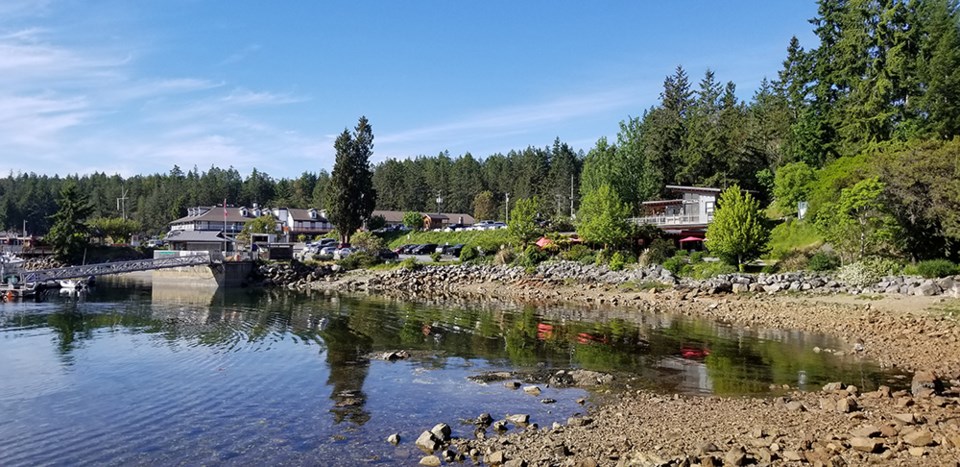Lund waterworks dominated conversation at a qathet Regional District’s (qRD) committee of the whole meeting.
At the May 28 committee of the whole meeting, directors heard delegations from the ministry of housing and municipal affairs, plus from Lund Waterworks District (LWD) receiver Frances Ladret, before having a lengthy discussion on the potential conversion of the waterworks district to a qRD asset.
Directors first heard from the ministry of housing and municipal affairs senior planning analyst Gareth Mogg, who outlined the process of conversion from an improvement district to a regional district asset.
He said an improvement district conversion is the transfer of the service, its assets and liabilities from the improvement district to the local government.
“Every conversion is unique, shaped by local context and service needs,” said Mogg. “qathet Regional District is particularly unique. The waterworks district overlaps treaty First Nation lands belonging to Tla’amin Nation. This means that besides considering the needs of the service area, we also need to provide consideration of how this might impact treaty rights and title.”
Mogg said there is no such thing as a forced conversion. He said conversion only happens when a local government and the improvement district are all onboard with converting.
“It’s important to ensure the community is well informed to help them make a decision on whether or not they do wish to convert,” added Mogg.
He said an improvement district can see conversion for a variety of reasons. Lund Waterworks District is currently in receivership. According to a staff report, the province, through the ministry of housing and municipal affairs (HMA), has been facilitating and shepherding dialogue regarding potential conversion of the improvement district water utility service to a qRD utility service, which will effectively pass ownership and operation of the LWD assets and infrastructure to the qRD. LWD serves 121 clients in the Lund area.
“With regards to Lund, my understanding is the infrastructure is old and in need of replacement, and also, the Lund board of trustees disbanded several years ago and the LWD has been operated by a receiver, which is a provincially appointed representative to oversee the improvement district,” said Mogg.
He said for improvement district ratepayers, voting no to a conversion may result in higher costs.
City of Powell River director Cindy Elliott asked what happens if the ratepayers don’t agree to the conversion. Mogg said there are implications to voting no, including increased costs and lack of access to grants, because grants require conversion to occur. He said closure of the improvement district could be an outcome.
“Dissolution is something we try to avoid,” said Mogg.
He said there appears to be a clear, defined need for the service in the area.
Director of governance services with HMA, Arielle Guetta, said if there is a desire to continue to operate the water system, it is required to meet health standards for the treatment of the water.
“They would need to figure out how they would pay for that,” said Guetta. “Improvement districts have access to private lending, but they would not have access to lending through the municipal finance authority, which generally has better rates.
“There are also the dams, and our understanding is that there are a couple of requirements on those dams. The community would have to figure out how it could potentially fund the improvements.”
Guetta said if ratepayers decided they did not want to continue with the water service, then the system gets wound down and everyone would have to figure out where they are going to receive their water from, independently.
Ladret then spoke to the committee, saying that Lund residents are paying for a substandard water system, having to buy drinking water because it is not potable. She said an $11 million grant has been approved and is waiting to be spent, so there is some frustration.
Ladret said the province should provide sufficient funding to bring water systems to a reasonable standard before having regional districts take them on with the liabilities and operational problems.
She said the qRD staff report had several good suggestions that would result in a quality water system.
“If funds were unlimited, I expect Lund ratepayers would truly agree to all of them,” said Ladret. “Funds are not unlimited.”
Ladret said what seems to have been lost is the needs versus wants approach approved by the previous receiver, and supported by an informal community advisory committee and the community at large, to come up with a system that would produce clean water and reliable infrastructure, to standards appropriate for the small community, and affordable for the taxpayers who will foot the bill.
“They are just asking for a modified system that works, will produce quality water, and will take care of any risks and liabilities that the regional district would assume,” said Ladret. “Affordability is the primary consideration of the Lund Water District. There has to be some modification or the people are not going to go for it – that is my sense.”
Later in the meeting, directors considered 12 items for discussion regarding the potential conversion of the LWD to a qRD asset. Directors referred most of the items back to staff for further elaboration.
The staff report stated that the financial impact of the conversion could be quite significant. The report stated that there are regulatory, administrative and potential legal challenges with the LWD that could come at significant costs for the qRD to manage if not resolved prior to conversion.
Last year, Meta censored Canadian news from its feeds, so we built our own social platform: syrupsocial.com – a newsfeed powered by Canadian journalists. Join the Peak on Syrup for the latest news from the Sunshine Coast and beyond, and add the Peak's email list for the top headlines right in your inbox Monday to Friday.



